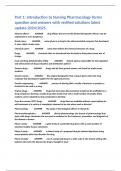-
1. Exam (elaborations) - Nursing pharmacology questions and answers with correct answers 2024/2025.
-
2. Exam (elaborations) - Nursing 101 pharmacology notes questions and answers with correct answers garaded a+ ...
-
3. Exam (elaborations) - Nursing pharmacology exam 1 questions and answers with verified solutions latest upda...
-
4. Exam (elaborations) - Nursing fundamentals: pharmacology questions and answers with verified solutions (gra...
-
5. Exam (elaborations) - Pharmacology for nursing exam 1 questions and answers with verified solutions latest ...
-
6. Exam (elaborations) - Nursing pharmacology semester 1 questions and answers with verified solutions latest ...
-
7. Exam (elaborations) - Nursing pharmacology - second year questions and answers with verified solutions late...
-
8. Exam (elaborations) - Nursing pharmacology lilley test 1 ch 1, 2, 45, 55 questions and answers with correct...
-
9. Exam (elaborations) - Nursing pharmacology exam 1 questions and answers with verified solutions latest upda...
-
10. Exam (elaborations) - Nursing pharmacology test 1 questions and answers with verified solutions latest upda...
-
11. Exam (elaborations) - Nursing pharmacology final exam questions and answers with verified solutions latest ...
-
12. Exam (elaborations) - Part 1: introduction to nursing pharmacology terms question and answers with verified...
-
13. Exam (elaborations) - Nursing pharmacology chapter 1 questions and answers with correct answers latest upda...
-
14. Exam (elaborations) - Nursing pharmacology exam 1 questions and answers with correct answers latest update.
-
15. Exam (elaborations) - Focus on nursing pharmacology chapter 4 2 questions and answers with correct answers ...
-
16. Exam (elaborations) - Fundamentals of nursing pharmacology questions and answers with correct answers (grad...
-
17. Exam (elaborations) - Nursing pharmacology questions and answers with verified solutions latest update 2024...
-
18. Exam (elaborations) - Chapter 1-fundamentals of nursing pharmacology questions and answers with verified so...
-
19. Exam (elaborations) - Nursing pharmacology - legal, ethical, social, and cultural issues questions and answ...
-
20. Exam (elaborations) - Fundamentals of nursing pharmacology questions and answers with verified solutions la...
-
21. Exam (elaborations) - Nursing pharmacology chapter 1 drug action questions and answers with correct answers...
-
22. Exam (elaborations) - Gastrointestinal drugs and medications: nursing pharmacology questions and answers wi...
-
23. Exam (elaborations) - Pharmacology and the nursing process questions and answers with verified solutions la...
-
24. Exam (elaborations) - Nursing pharmacology abbreviations questions and answers with verified solutions 2024...
-
25. Exam (elaborations) - Pre-nursing pharmacology questions and answers with verified solutions latest update ...
-
26. Exam (elaborations) - Chapter 4: the nursing process and pharmacology questions and answers with verified s...
-
27. Exam (elaborations) - Pediatric nursing: pharmacology questions and answers with verified solutions latest ...
-
28. Exam (elaborations) - Nursing pharmacology abbreviations questions and answer with verified solutions lates...
-
29. Exam (elaborations) - Pharmacology: nursing responsibilities questions and answers with verified solutions ...
-
30. Exam (elaborations) - Nursing pharmacology: chapter 4 questions and answers with correct answers (graded a+...
-
31. Exam (elaborations) - Nursing pharmacology introduction questions and answers with verified solutions.
-
32. Exam (elaborations) - Nursing pharmacology questions and answers with verified solutions, with the latest u...
-
33. Exam (elaborations) - Pharmacology basic principles in nursing pharmacology questions and answers with veri...
-
34. Exam (elaborations) - Module 1: introduction to nursing pharmacology questions and answers with verified so...
-
35. Exam (elaborations) - Nursing pharmacology exam 1 questions and answers with verified solutions latest upda...
-
36. Exam (elaborations) - Introduction to nursing pharmacology-chapter 1 questions and answers with verified so...
-
37. Exam (elaborations) - Clinical pharmacology in nursing practice questions and answers with verified solutio...
-
38. Exam (elaborations) - Simple nursing pharmacology questions and answers with verified solutions latest upda...
-
39. Exam (elaborations) - Pharmacology nursing i exam 3 questions and answers with correct answers latest updat...
-
40. Exam (elaborations) - Pharmacology 1st semester nursing questions and answers with verified solutions lates...
-
41. Exam (elaborations) - Nursing: pharmacology questions and answers with verified solutions latest update 202...
-
42. Exam (elaborations) - Nursing pharmacology exam 1 questions and answers with verified solutions latest upda...
-
43. Exam (elaborations) - Nursing pharmacology: chapter 5 questions and answers with correct answers (graded a+...
-
44. Exam (elaborations) - Unit 1: introduction to nursing pharmacology questions and answers with verified solu...
-
45. Exam (elaborations) - Nursing pharmacology - core concepts questions and answers with correct answers lates...
-
46. Exam (elaborations) - Nursing pharmacology adrenergic drugs questions and answers with verified solutions l...
-
47. Exam (elaborations) - Nursing pharmacology 1, exam 2 questions and answers with correct answers (graded a+)...
-
Show more





